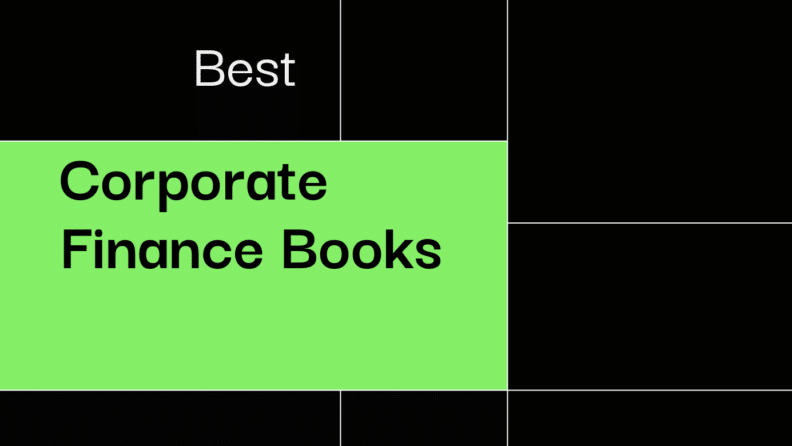Ah yes, is there anything better than a good ol' corporate finance book?
If you said no, I'd love to interview you... because that's wild.
Regardless of how much you love corporate finance books, welcome. Your pursuit of financial wisdom has brought you here, and together, we can explore the books that will serve as guides for you in the world of finance.
Overview Of The 15 Best Corporate Finance Books
Explore my curated list of corporate finance books, each chosen for its insightful approach to complex fiscal challenges.
- Principles of Corporate Finance by Richard A. Brealey, Stewart C. Myers, Franklin Allen
- Corporate Finance For Dummies by Michael Taillard
- Deep Finance: Corporate Finance in the Information Age by Glenn Hopper
- Lessons in Corporate Finance: A Case Studies Approach to Financial Tools, Financial Policies, and Valuation by Paul Asquith and Lawrence A. Weiss
- The Essays of Warren Buffett by Warren Buffett and Lawrence A. Cunningham
- Project Finance in Theory and Practice: Designing, Structuring, and Financing Private and Public Projects by Stefano Gatti
- Manias, Panics, and Crashes by Charles P. Kindleberger
- Mastering Financial Calculations by Bob Steiner
- Corporate Finance: The Basics by Terence C.M. Tse
- Valuation: Measuring and Managing the Value of Companies by McKinsey & Company Inc
- The Finance Curse by Nicholas Shaxson
- The Myth of Capitalism by Jonathan Tepper
- Corporate Finance Fundamentals: Big Business Theory for SME, Investor or MBA Application by Saad
- Corporate Finance: A Practical Approach by Michelle R. Clayman, Martin S. Fridson, and George H. Troughton
- Corporate Finance Made Simple: Corporate Finance Explained in 100 Pages or Less by Mike Piper
The 15 Best Corporate Finance Books
1. Principles of Corporate Finance by Richard A. Brealey, Stewart C. Myers, Franklin Allen
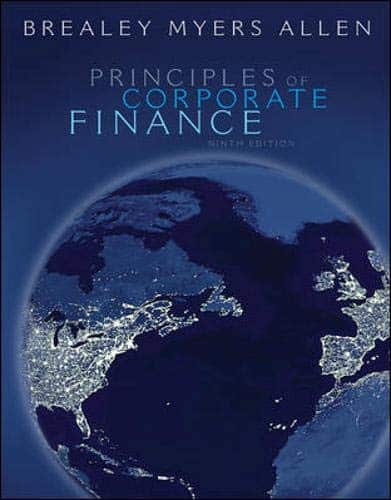
Summary:
Principles of Corporate Finance delivers an extensive dive into financial methodologies, offering insights into strategies for valuing financial securities and navigating the intricate realm of risk and return.
What You'll Learn:
Gain insights into various theories, concepts, and applications of corporate finance, and acquire knowledge about the tools and techniques employed in strategic financial decision-making.
Why You Should Read It:
This book not only elucidates the theories of financial management in corporate environments but also supplements key concepts with case studies.
Quote From The Book:
"The goal of the company must be subordinated to that of the economy."
About The Author:
The authors, renowned figures in the financial academic world, have paved the way for modern financial theories and practices through their extensive research and teachings.
2. Corporate Finance For Dummies by Michael Taillard

Summary:
Corporate Finance For Dummies simplifies the sophisticated aspects of corporate finance, translating complex topics into comprehensible segments, thereby making it a remarkable entry point for beginners in financial studies.
What You'll Learn:
Absorb foundational corporate finance principles, manage financial statements, and explore the intricacies of budgeting and forecasting.
Why You Should Read It:
Dr. Taillard effectively dissects complex topics and offers practical insights, making corporate finance accessible and pertinent for both newcomers and seasoned professionals.
Quote From The Book:
"Knowing where your company has been and where it currently is financially is necessary, but it’s not enough"
About The Author:
Dr. Michael Taillard is an economist and author, widely recognized for breaking down intricate financial concepts into accessible insights. Connect with Michael on LinkedIn for updates.
3. Deep Finance: Corporate Finance in the Information Age by Glenn Hopper

Summary:
Deep Finance offers an exploration into the role and implications of technology in modern corporate finance, elucidating the relationship between financial strategy and IT.
What You'll Learn:
Understand the symbiotic connection between information technology and finance, while exploring novel strategies, methodologies, and risks emerging from this overlap.
Why You Should Read It:
Hopper distills the essence of technology in the financial realm, unraveling how IT is not just an operational element but a strategic fulcrum in financial decision-making.
About The Author:
Glenn Hopper, an expert navigating the intersections of finance and technology, brings rich insights from both sectors to Deep Finance. Get more updates about him on his LinkedIn and Twitter.
4. Lessons in Corporate Finance: A Case Studies Approach to Financial Tools, Financial Policies, and Valuation by Paul Asquith and Lawrence A. Weiss
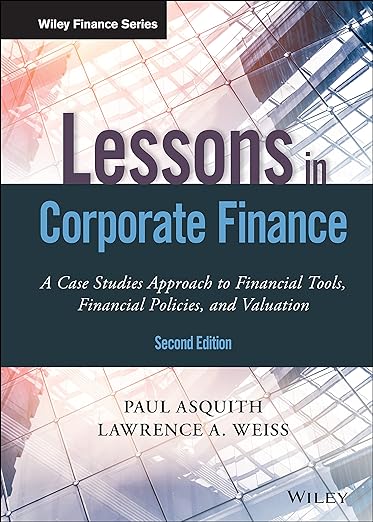
Summary:
Lessons in Corporate Finance employs a case-study method, dissecting real-world financial scenarios and unraveling the underpinning theories in applied corporate finance.
What You'll Learn:
Read through real financial situations, learning applicable tools, policies, and valuation methods relevant to tangible corporate scenarios.
Why You Should Read It:
The authors leverage their academic and practical expertise, presenting readers with a pragmatic and enriched learning experience.
About The Author:
Paul Asquith and Lawrence A. Weiss, acclaimed professors from MIT and Tufts University, bring to the table their decades of experience through work and teaching in the sphere of finance.
5. The Essays of Warren Buffett by Warren Buffett and Lawrence A. Cunningham
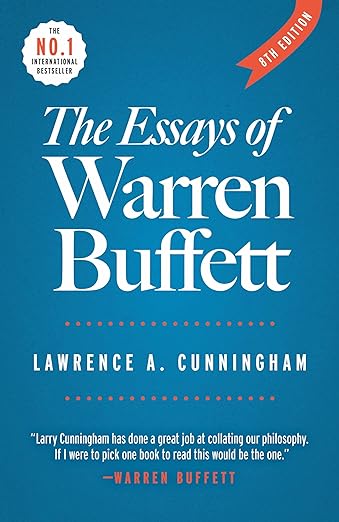
Summary:
This book unveils the investment wisdom of Warren Buffett, presenting his insightful essays that span a multitude of topics, all tethered to the realm of corporate finance and investment.
What You'll Learn:
Buffett's tips for wise investment, corporate governance, finance fundamentals, and more.
Why You Should Read It:
Buffett’s candidness and wisdom in these essays offer a rare insight into the mind of a man who exemplifies the strategic investor.
Quote From The Book:
"Price is what you pay. Value is what you get."
About The Author:
Warren Buffett, the "Oracle of Omaha", is globally revered for his investment acumen and philanthropic ventures. Follow him on Twitter and check out his website for updates.
6. Project Finance in Theory and Practice: Designing, Structuring, and Financing Private and Public Projects by Stefano Gatti

Summary:
Stefano Gatti unpacks project finance, offering a comprehensive look at designing, structuring, and financing both private and public projects.
What You'll Learn:
Engage in deep dives into risk management, financial modeling, financial reporting, portfolio management, and the legal and contractual frameworks that underpin various project finance ventures.
Why You Should Read It:
Gatti's in-depth exploration provides both foundational and advanced knowledge, ensuring readers are well-equipped to navigate the world of project finance.
Quote From The Book:
Project finance is the financing of long-term infrastructure, industrial projects, and public services, based upon a non-recourse or limited recourse capital structure, in which project debt and equity used to finance the project are paid back from the cash flow generated by the project.
Dry? Yes.
Useful? Definitely.
About The Author:
Stefano Gatti is an esteemed academic and author who has contributed significantly to the literature of finance; particularly in the niche of project finance. Connect with him on LinkedIn for updates.
7. Manias, Panics, and Crashes by Charles P. Kindleberger
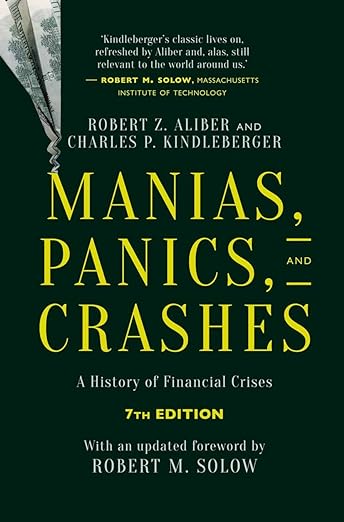
Summary:
Get deep into the tumultuous world of financial crises, exploring their history, impact, and the rhythmic patterns that characterize them.
What You'll Learn:
The anatomy of financial crises, their cyclical nature, and how economic mechanisms can both fuel and mitigate them.
Why You Should Read It:
If you want to learn what causes financial crises through study rather than inflammatory headlines, this is the book for you. Manias, Panics, and Crashes provide an illuminating historical lens to understand, anticipate, and navigate through financial crises.
Quote From The Book:
"Financial crises are associated with the peaks of business cycles."
About The Author:
Charles P. Kindleberger, an esteemed economist, has left an indelible mark on the study of economic history and international economics.
8. Mastering Financial Calculations by Bob Steiner
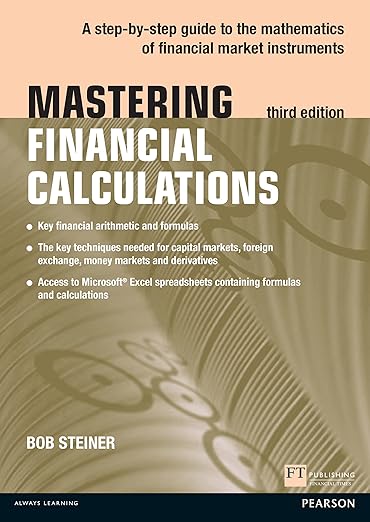
Summary:
Bob Steiner presents a step-by-step guide to mastering complex financial calculations and instruments, such as capital markets and foreign exchange.
What You'll Learn:
Develop proficiency in undertaking various financial calculations, ensuring accuracy and efficacy in financial analysis and decision-making.
Why You Should Read It:
If you're involved with larger companies, money markets will impact you. Steiner's straightforward approach simplifies complex financial calculations, enhancing your financial decision-making toolkit.
Quote From The Book:
“Understanding how to use yield curves to forecast interest rates is a key skill.”
About The Author:
Bob Steiner, a veteran in the financial realm with a keen focus on forex and treasury management, has been instrumental in simplifying and teaching financial calculations through his writing.
9. Corporate Finance: The Basics by Terence C.M. Tse
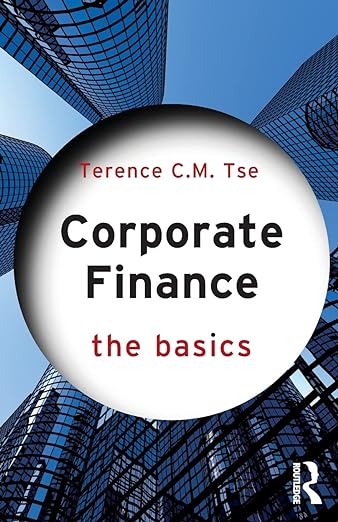
Summary:
As you may have guessed from its name, this book aims to give readers a foundational understanding of basic corporate finance principles and applications.
What You'll Learn:
Core principles of corporate finance, including capital management and risk management.
Why You Should Read It:
It forms a concise, comprehensible foundation on corporate finance for beginners, entrepreneurs, and small business owners, ensuring a solid grounding in the fundamentals.
Quote From The Book:
“Finance can be fun, and by the end of this book, you will agree.”
About The Author:
Terence C.M. Tse is an acclaimed professor, speaker, and author in the realm of corporate finance, providing insights that bridge theory and practical application. Connect with him and explore more of his work through his LinkedIn and Twitter.
10. Valuation: Measuring and Managing the Value of Companies by McKinsey & Company Inc.
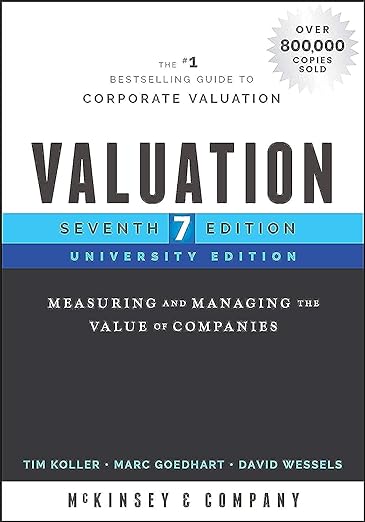
Summary:
This book, curated by the experts at McKinsey, offers a robust framework for valuing companies, providing actionable strategies to drive sustainable business growth and value creation.
What You'll Learn:
Insights on measuring and managing company value while aligning it with strategies for growth and profitability.
Why You Should Read It:
It grants access to McKinsey's coveted valuation strategies and methodologies, proven to enhance value creation and management.
Quote From The Book:
“Real options can be found almost anywhere in the realm of investment decision-making.”
About The Author:
McKinsey & Company Inc. stands as a global giant in management consulting, known for its influential strategies and frameworks in business finance and beyond. Discover more insights and global perspectives on their LinkedIn, Twitter, and official website.
11. The Finance Curse by Nicholas Shaxson
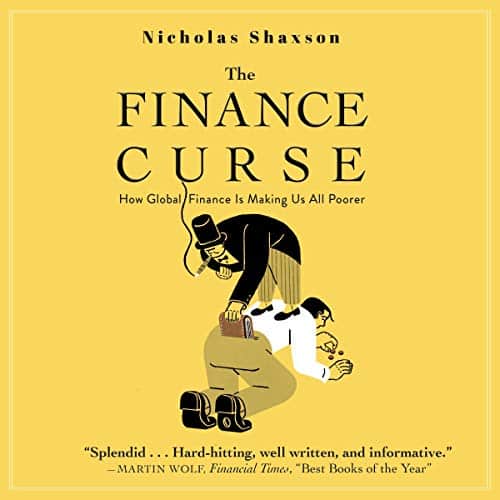
Summary:
Nicholas Shaxson unveils the dark underbelly of global finance, demonstrating how excessive reliance on financial services can impair national economies and perpetuate inequality.
What You'll Learn:
Real-world examples of hidden corridors within global finance, exploring its consequential impacts on economies, societies, and politics.
Why You Should Read It:
The book gives a stark perspective on the power and potential perils of global finance. Whilst not the most uplifting book, I think this is an essential read for anyone entering the finance profession.
Quote From The Book:
“The finance curse is the story of how finance can get too big, and what comes of this.”
About The Author:
Nicholas Shaxson, a prominent journalist and writer, harbors a critical eye towards global finance and its overarching impacts on society. Dive deeper into his thoughts and discoveries on his Twitter.
12. The Myth of Capitalism by Jonathan Tepper

Summary:
Jonathan Tepper addresses the monopolies present in modern capitalism, presenting a compelling argument about the erosion of competitive markets and its ramifications on economic equality and opportunity.
What You'll Learn:
An in-depth exploration of corporate monopolies and oligopolies, their stifling effect on competitive markets, and the resultant societal and economic impacts.
Why You Should Read It:
It sheds light on an often-overlooked aspect of modern capitalism—providing a critical perspective on the dwindling competition in global markets and its outcome.
Quote From The Book:
“Capitalism without competition is not capitalism.”
About The Author:
Jonathan Tepper, a founder of Variant Perception, a macroeconomic research group, intricately explores and dissects the facets of capitalism and global economies.
13. Corporate Finance Fundamentals: Big Business Theory for SME, Investor or MBA Application by Saad
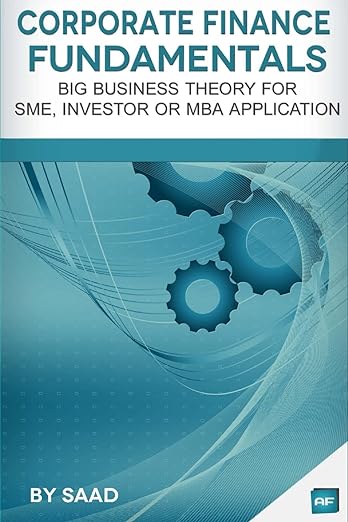
Summary:
Corporate Finance Fundamentals offers an in-depth look into the core concepts of corporate finance, specifically tailored for small and medium-sized enterprises (SMEs). Saad breaks down intricate financial theories into digestible lessons, bridging the gap between academia and real-world application.
What You'll Learn:
The book delves into a range of topics from capital budgeting and valuation techniques, to risk management. Saad's approach ensures that even those without a formal finance background can grasp the concepts and apply them effectively in a business setting.
Why You Should Read It:
This book makes complex financial concepts accessible and applicable to everyday business scenarios.
Quote From The Book:
"Finance isn't just about numbers; it's about strategically directing resources to maximize value."
About The Author:
Saad is a finance expert with a passion for making corporate finance accessible to a wider audience.
14. Corporate Finance: A Practical Approach by Michelle R. Clayman, Martin S. Fridson, and George H. Troughton
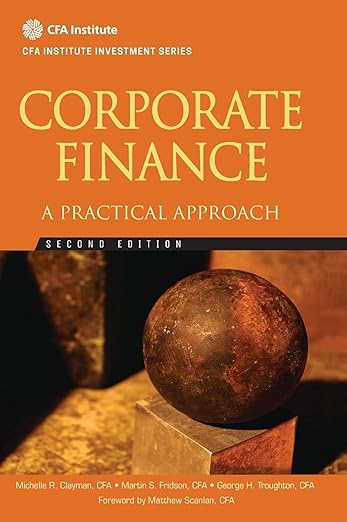
Summary:
This book is all about connecting financial concepts to real-world applications. The authors, all seasoned experts in the field, present the subject matter in an accessible manner, giving you real reasons to care about what they teach.
What You'll Learn:
This book covers a myriad of topics, from the basics of financial analysis to the complexities of mergers and acquisitions. Throughout, the authors place a strong emphasis on practicality, ensuring readers can readily apply their newfound knowledge.
Why You Should Read It:
It's hard to chew through corporate finance books, especially if they feel disconnected from what you're actually doing. This book is all about eliminating that disconnect.
Quote From The Book:
"The essence of corporate finance isn't just about crunching numbers; it's about understanding their implications and making strategic choices."
About The Authors:
Michelle R. Clayman, Martin S. Fridson, and George H. Troughton are renowned figures in the finance industry, known for their expertise and contributions to the field.
15. Corporate Finance Made Simple: Corporate Finance Explained in 100 Pages or Less by Mike Piper
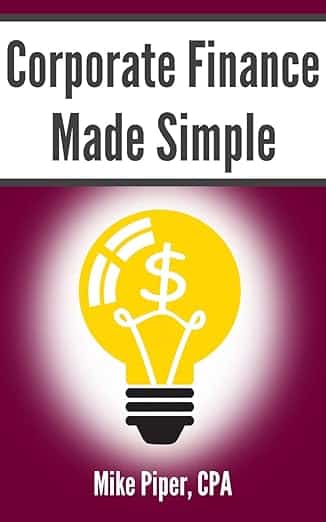
Summary:
Corporate Finance Made Simple is Mike Piper's concise guide to the world of corporate finance. In line with its title, Piper ensures that even those with no prior knowledge of the subject can grasp the essentials of corporate finance in a relatively short amount of time.
What You'll Learn:
Readers will be introduced to the foundational concepts of corporate finance, from the basics of financial statements and ratios to the intricacies of capital budgeting and valuation.
Why You Should Read It:
If you're seeking a quick but thorough introduction to corporate finance without getting bogged down in excessive details, this is the book for you.
Quote From The Book:
"Understanding the financial backbone of a corporation doesn't require an MBA; it requires clarity, simplicity, and the right approach."
About The Author:
Mike Piper is a well-respected author in the world of finance, known for his ability to simplify complex topics for a broad audience. You can connect with him on Twitter, or visit his personal website.
Which Corporate Finance Books Do You Recommend?
Your input is invaluable to me and the rest of the people reading this. Have I missed any bestseller corporate finance books that have influenced your journey? Share your recommendations in the comments below!
If you'd like more financial insights and tips to come straight to you, subscribe to The CFO Club's newsletter and get ready to level up as a financial operator.

